This post was originally published on this site
“Stranger Things” is no stranger to shilling things.
The fourth season of the hit Netflix series continues the show’s tradition of featuring countless consumer brands front and center. The main characters are dipping into jars of Jif peanut butter, playing games of Dungeons & Dragons, or sporting a cool Levi’s denim vest. And let’s not forget the telekinetic Eleven’s attempts to crush a can of Coca-Cola using her mind alone. In fact, the Product Placement Blog, which tracks brands on TV shows, spotted more than 140 during the first seven episodes of “Stranger Things 4,” including Skittles candy, a Minute Maid juice box, the Sony Walkman and Miller beer.
The final two episodes of season four were just released for the Fourth of July holiday weekend. And such product placements have real value as a form of advertising — and marketing professionals say they could easily be worth tens of millions of dollars in exposure for the brands showcased on “Stranger Things.”
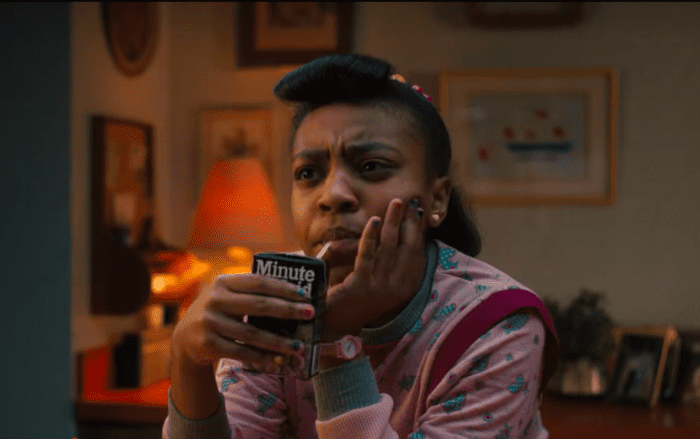
Brands like Minute Maid (being sipped by Priah Ferguson’s Erica Sinclair) are often front and center in season four of “Stranger Things.”
Netflix
Concave Brand Tracking, a British company that analyzes placements in movies, television and other outlets, put the advertising value of being featured on season three of “Stranger Things” at $15 million when it last looked at the ’80s-themed sci fi/horror series created by the sibling team of Matt and Ross Duffer. Concave managing director Dominic Artzrouni told MarketWatch that he hasn’t done a similar study for the fourth season, but he noted the level of product placement appears to be “on par” with what the show has done in the past.
Craig Agranoff, a Florida-based marketing executive, said the value could be considerably higher because of the show’s surging popularity. He put an estimate of $25 million in free publicity for appearing on the show.
And Stacy Jones, chief executive officer of Hollywood Branded, a marketing agency that specializes in product placements, said the value could “range into the realms of ridiculousness” — largely because she anticipates the series will have such staying power.
“’Stranger Things’ is going to be something people watch 15 or 20 years from now,” she said.
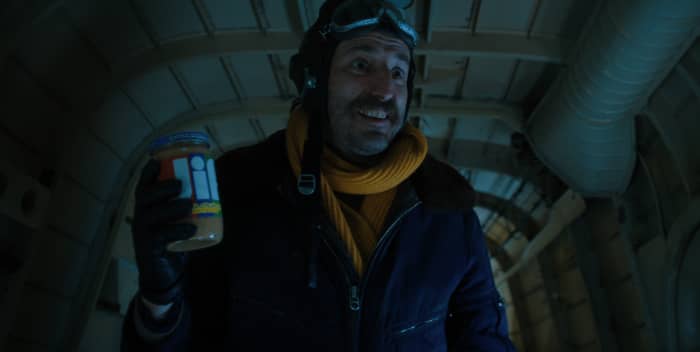
Jif peanut butter gets plenty of time to shine during part one of “Stranger Things 4.”
Courtesy of Netflix
Indeed, plenty of people are watching the new round of episodes. Netflix reported that the fourth season’s debut broke a network opening-weekend record for an English-language series, with subscribers clocking in 287 million hours of viewing over Memorial Day weekend.
And what other Netflix
NFLX,
shows were among the network’s most-watched programs of the past week? Naturally, the first three seasons of “Stranger Things.”
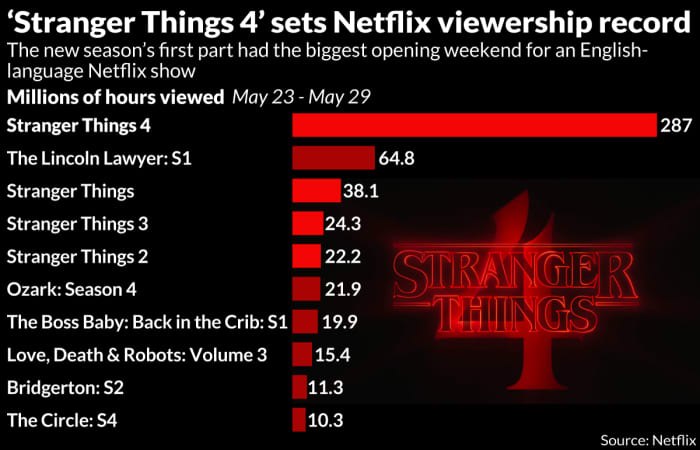
In the past, Netflix said it hasn’t charged companies that are featured in the show, despite the fact that such product placements can traditionally run as much as $1 million, according to Stacy Jones. In its report on the third season of “Stranger Things,” Concave quoted a Netflix spokesperson as follows: “None of the brands and products that appear in ‘Stranger Things 3’ were paid for or placed by third parties. They’re all part of the Duffer Brothers’ storytelling, which references 1980s consumer and popular culture.”
Netflix didn’t respond to a MarketWatch request for comment.
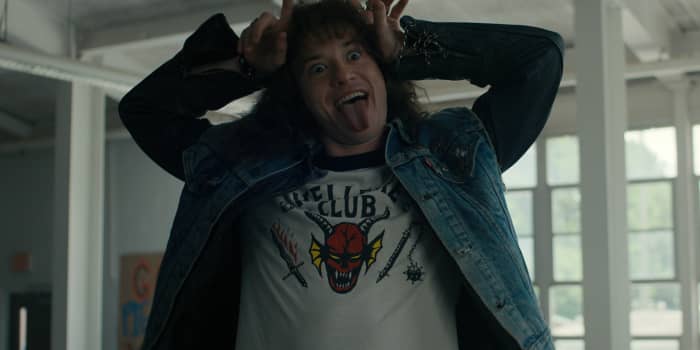
Joseph Quinn, aka newcomer Eddie Munson, sports a signature Levi’s denim vest throughout “Stranger Things 4.”
Courtesy of Netflix
Even brands that aren’t featured in “Stranger Things” are finding ways to ride its coattails by creating product promotions or tie-ins with the series. Domino’s has launched a “Stranger Things”-inspired app for ordering a pizza. Doritos has an extra cheesy “3D” chip connected to the show.
“We refer to it as fame by association,” said Kathleen Nelson, founder and president of PopLap Marketing, an agency that works with brands.
Nelson speaks from experience: She worked with Sperry, the brand known for its boat shoes, on creating a footwear line tied to the Netflix “Outer Banks” series. “It sold out in less than a week,” she said.
It’s a little early to tell what effect the new season of “Stranger Things” could be having on sales for brands tied to the series. But officials with Domino’s said they are pleased so far with the response to the pizza chain’s “Stranger Things” app.
“We’re getting so much feedback. It brings people back to their childhood in the ‘80s,” said Kate Trumbull, a Domino’s senior vice president. Domino’s officials wouldn’t share sales figures, however.
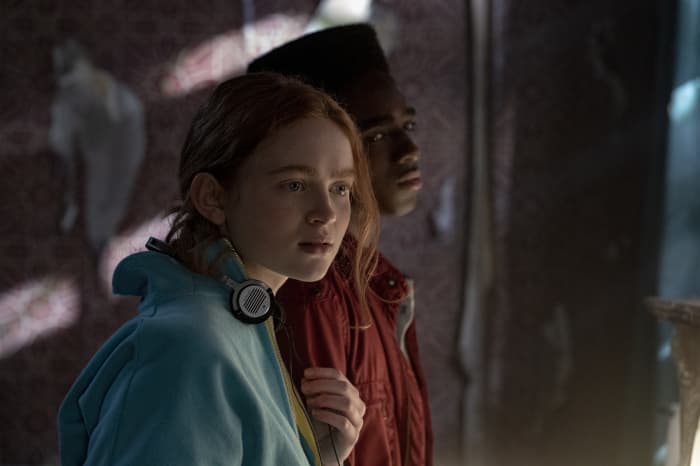
Sadie Sink (l.) as Max Mayfield listens to Kate Bush with her Sony Walkman on “Stranger Things 4” — which put Bush on the top of iTunes after the season premiered.
Tina Rowden/Netflix
One clear beneficiary from the “Stranger Things” phenomenon is Kate Bush, the English singer-songwriter who rose to fame in the ‘80s. Bush’s 1985 single, “Running Up That Hill (A Deal with God),” plays a key role in the fourth season. The 37-year-old song reached the No. 1 spot on iTunes days after the season premiered.
Then, there’s “Stranger Sings! The Parody Musical.” The show, which is a song-filled spoof on the series, was a hit in New York when it opened off-Broadway in 2021. It’s now coming to London and Australia, with a return to New York planned later this year as well. Its creators say the musical is a “love letter” to what “Stranger Things” represents –- namely, nostalgic charm and plenty of adventure, particularly of the inter-dimensional kind.
Not to be outdone, Broadway is banking on some “Stranger Things” buzz, too. Gaten Matarazzo, a popular cast member of the Netflix series, will soon be appearing in the Tony Award-winning musical, “Dear Evan Hansen.”

